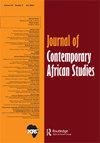Dualism’s dilemmas: citizenship and migration in contemporary eSwatini
IF 0.8
Q2 AREA STUDIES
引用次数: 0
Abstract
ABSTRACT One of the main characteristics of ‘Swatiness’ has been embracing lived dualisms in all aspects of life, including the much-debated cultural dualism of traditionalism and modernity which, although not unique to eSwatini, is more emphasised in this small southern African kingdom. This article discusses examples from research on eSwatini citizens living in South Africa and foreign-born residents of eSwatini, to show how exclusionary singular forms of bureaucratic identification via national identity cards are endangering the flexibility and creativity which are distinctive of Swati socio-cultural life. These bureaucratic forms run counter the inclusive, relational and negotiated dimensions of older conceptions and practices of citizenship and belonging.二元论的困境:当代斯瓦蒂尼的公民身份与移民
“斯瓦蒂尼”的主要特征之一是在生活的各个方面都拥抱生活的二元论,包括备受争议的传统主义和现代文化的二元论,尽管这不是斯瓦蒂尼独有的,但在这个南部非洲的小王国却更加强调。本文讨论了对生活在南非的斯瓦蒂尼公民和外国出生的斯瓦蒂尼居民的研究实例,以表明通过国民身份证的排他性单一形式的官僚身份如何危及斯瓦蒂社会文化生活特有的灵活性和创造力。这些官僚形式与公民身份和归属感的旧概念和实践的包容性、关系性和协商性背道而驰。
本文章由计算机程序翻译,如有差异,请以英文原文为准。
求助全文
约1分钟内获得全文
求助全文
来源期刊

Journal of Contemporary African Studies
AREA STUDIES-
CiteScore
2.20
自引率
0.00%
发文量
18
期刊介绍:
Journal of Contemporary African Studies (JCAS) is an interdisciplinary journal seeking to promote an African-centred scholarly understanding of societies on the continent and their location within the global political economy. Its scope extends across a wide range of social science and humanities disciplines with topics covered including, but not limited to, culture, development, education, environmental questions, gender, government, labour, land, leadership, political economy politics, social movements, sociology of knowledge and welfare. JCAS welcomes contributions reviewing general trends in the academic literature with a specific focus on debates and developments in Africa as part of a broader aim of contributing towards the development of viable communities of African scholarship. The journal publishes original research articles, book reviews, notes from the field, debates, research reports and occasional review essays. It also publishes special issues and welcomes proposals for new topics. JCAS is published four times a year, in January, April, July and October.
 求助内容:
求助内容: 应助结果提醒方式:
应助结果提醒方式:


